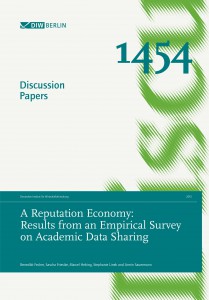Unsere vernetzte Welt verstehen

Die akademische Welt ist eine Reputationswirtschaft
Im Herbst 2014 haben HIIG-Forscher Benedikt Fecher und seine KollegInnen eine Umfrage zum akademischen Datenaustausch unter 1564 Forschenden in Deutschland durchgeführt – eine Folgestudie zu ihrer Arbeit „What Drives Academic Data Sharing“? In der Umfrage haben sie Forschende zu ihrem Umgang mit Forschungsdaten, ihrer Publikationskultur und insbesondere darüber befragt, was sie davon abhält, Daten anderen zugänglich zu machen.
One has to know that reusing data is often regarded as the next big thing in academic research. It encourages collaboration among researchers and allows finding synergies in the laborious task of collecting data. Moreover, it makes research results reproducible and allows using old data for new research questions. In short: It has the potential to foster scientific progress. It is not surprising that funding agencies, academic journals, policy makers, and researchers themselves increasingly demand open access to research data. With regards to research data, Neelie Kroes, the European Commissioner for Digital Agenda, says: “open access to research results will boost Europe’s innovation capacity“.
To some extent, however, open access to research data is just like the electric car that everyone likes but nobody drives. In our survey, only 13% of the researchers have ever made data available publicly. 37% of the respondents said that it is uncommon to share data in their community. At the same time, 88% would like to use data for their own research. The results bring out quite clearly the mismatch between the aspirations and the empirical reality. The bitter reality about Open Access to research data is that everyone likes the idea but nobody follows it through.
 Last week, we published the first article based on the results of our survey. Our main argument is that academia is a reputation economy, an exchange system that is not driven by monetary incentives, nor the desire for scientific progress, but by individual reputation. Reputation is expressed in (high ranked journal) publications whereas sharing data receives not enough formal recognition. In our view, data sharing will only be widely adopted among research professionals if it pays in form of reputation. Policy measures that intend to foster research collaboration need to understand this aspect of academia. Successful measures must ascribe more value intermediate products, such as research data, more highly than it is the case now.
Last week, we published the first article based on the results of our survey. Our main argument is that academia is a reputation economy, an exchange system that is not driven by monetary incentives, nor the desire for scientific progress, but by individual reputation. Reputation is expressed in (high ranked journal) publications whereas sharing data receives not enough formal recognition. In our view, data sharing will only be widely adopted among research professionals if it pays in form of reputation. Policy measures that intend to foster research collaboration need to understand this aspect of academia. Successful measures must ascribe more value intermediate products, such as research data, more highly than it is the case now.
The article can be found on SSRN.
The questionnaire can be found on our Github Page.
Foto: Sharing is Caring von Niklas Wikström, CC BY-NC 2.0
Dieser Beitrag spiegelt die Meinung der Autorinnen und Autoren und weder notwendigerweise noch ausschließlich die Meinung des Institutes wider. Für mehr Informationen zu den Inhalten dieser Beiträge und den assoziierten Forschungsprojekten kontaktieren Sie bitte info@hiig.de

Jetzt anmelden und die neuesten Blogartikel einmal im Monat per Newsletter erhalten.
Offene Hochschulbildung
Netzecho: Reaktionen auf die Tagesschau in Einfacher Sprache
Seit 2024 gibt es die Tagesschau in Einfacher Sprache. Wie wird das neue Nachrichtenformat von Nutzer*innen im Internet diskutiert?
Chancen gegen Einsamkeit: Wie Pflegeeinrichtungen das Quartier vernetzen
Was hilft gegen Einsamkeit im Alter? Pflegeeinrichtungen schaffen neue Räume für Gemeinschaft und digitale Teilhabe.
Unfreiwillig nackt: Wie Deepfake Porn sexualisierte Gewalt gegen Frauen verschärft
Deepfake Porn nutzt KI, um täuschend echte Nacktbilder ohne Einwilligung zu erzeugen, meist von Frauen. Wie können wir Betroffene besser schützen?




